iHeartDogs is reader supported. Some of the links below may be paid affiliate links, where we receive a small commission on a product at no additional cost to you.
In today’s increasingly health-conscious world, many pet parents are seeking out the most natural and wholesome options for their furry family members. One major consideration that has grown in popularity is non-GMO dog food. GMOs, or genetically modified organisms, are organisms that have been altered through genetic engineering, which can raise concerns about their long-term effects on both human and pet health. For dog owners looking to steer clear of these ingredients in their pet’s diet, non-GMO dog foods offer a compelling alternative. In this article, we will explore the best non-GMO dog food options available, breaking down their benefits, nutritional value, and what makes them stand out in a crowded market.
#1 – HORIZON PET NUTRITION Pulsar Whole Grain, Non-GMO, Meat Dense All Life Stage Dry Dog Food 25 lb Bag
Horizon Pet Nutrition Pulsar Whole Grain Dry Dog Food is a meat-dense formula that is free of by-products and rich in protein. With 66% animal protein content, this dog food prioritizes meat as the main ingredient. The carbohydrate source is locally sourced, non-GMO whole grains that exclude soy, corn, wheat, and potatoes, promoting a low glycemic diet. Additionally, this product includes uniquely formulated vitamins and minerals and high levels of probiotics to support gut and intestinal health. The company strives to source ingredients locally from trusted growers whenever possible.
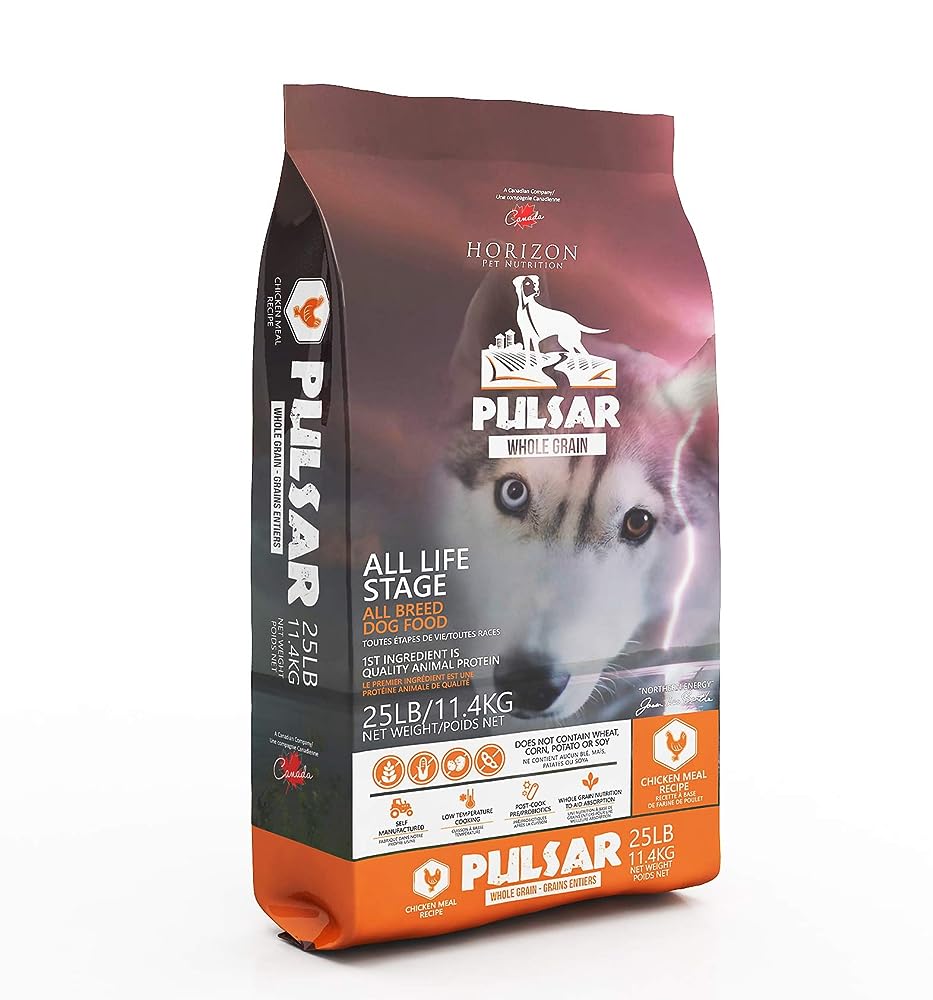

#2 – HORIZON PET NUTRITION Pulsar Grain Free, Non-GMO, Meat Dense All Life Stage Dry Dog Food, 25 lb
The HORIZON PET NUTRITION Pulsar Grain Free, Non-GMO, Meat Dense All Life Stage Dry Dog Food is a protein-rich formula that contains 66% animal protein content. It focuses on meat and avoids by-products, soy, corn, wheat, and potato to promote a low glycemic diet. Dog food also includes vitamins, minerals, and probiotics to support overall health and gut function. Local sourcing of ingredients is prioritized whenever possible.


#3 – Open Farm Freeze Dried Raw Dog Food, Humanely Raised Meat Recipe with Non-GMO Superfoods and No Artificial Flavors or Preservatives, Grass Fed Beef Recipe Freeze Dried – 3.5oz
Open Farm Freeze Dried Raw Dog Food is a reimagined product with new packaging and ingredients that aims to provide a tastier and healthier option for dogs. It can be mixed into meals as dry nuggets or rehydrated for soft, moist bites. The recipe uses humanely raised meat and non-GMO superfoods without any artificial flavors or preservatives, offering full-coverage nutrition for dogs of any breed. Additionally, the company emphasizes transparency by allowing owners to trace the origin of every ingredient using the lot number on the bag.

#4 – Open Farm Freeze Dried Raw Patties for Dogs, Humanely Raised Meat Recipe with Non-GMO Superfoods and No Artificial Flavors or Preservatives, Harvest Chicken Recipe, 10.5oz
Open Farm Freeze Dried Raw Patties for Dogs is a food option made with humanely raised raw chicken and organic leafy greens and pumpkin seeds. It can be used as a kibble booster or mixer, and can also be rehydrated with water or bone broth for softer bites. The patties provide dogs with protein and probiotic fiber, and the recipe excludes wheat, corn, and potato in favor of fresh superfoods like pumpkin and leafy greens. Open Farm also emphasizes transparency by allowing owners to trace the origin of every ingredient using the lot number on the bag.
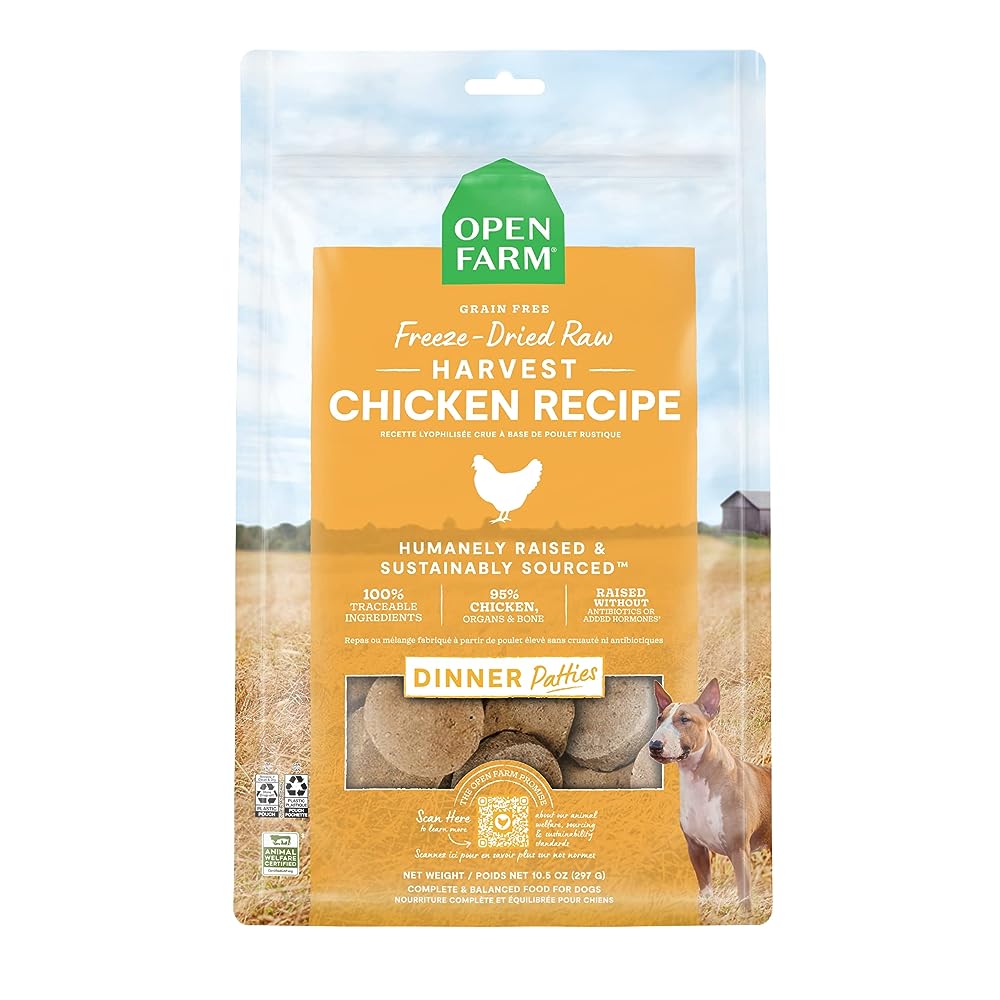
#5 – Open Farm Wild-Caught Salmon Grain-Free Dry Dog Food, Fresh Pacific Salmon Recipe with Non-GMO Superfoods and No Artificial Flavors or Preservatives, 4 lbs
Open Farm Wild-Caught Salmon Grain-Free Dry Dog Food is a high-quality dog food made with real wild-caught salmon using sustainable fishing practices. The formula is designed to provide essential nutrients and vitamins for your dog’s overall well-being. It is grain-free and made with natural superfoods like pumpkin, carrot, and coconut oil. The brand also prioritizes transparency, allowing owners to trace the origin of every ingredient.

#6 – HORIZON PET NUTRITION Complete Whole Grain, Non-GMO, Meat Dense Large Breed Dry Dog Food 25 lb Bag
Horizon Pet Nutrition’s Complete Whole Grain dog food is a meat-dense, non-GMO product designed for large breed dogs. It contains 71% animal protein and locally sourced whole grain carbohydrates, avoiding soy, corn, wheat, or potato. The formula includes vitamins, minerals, and probiotics to support gut health, and is free from preservatives, by-products, food dyes, steroids, and growth hormones. Specifically formulated for adult large-breed dogs, it also includes glucosamine and chondroitin for joint health.
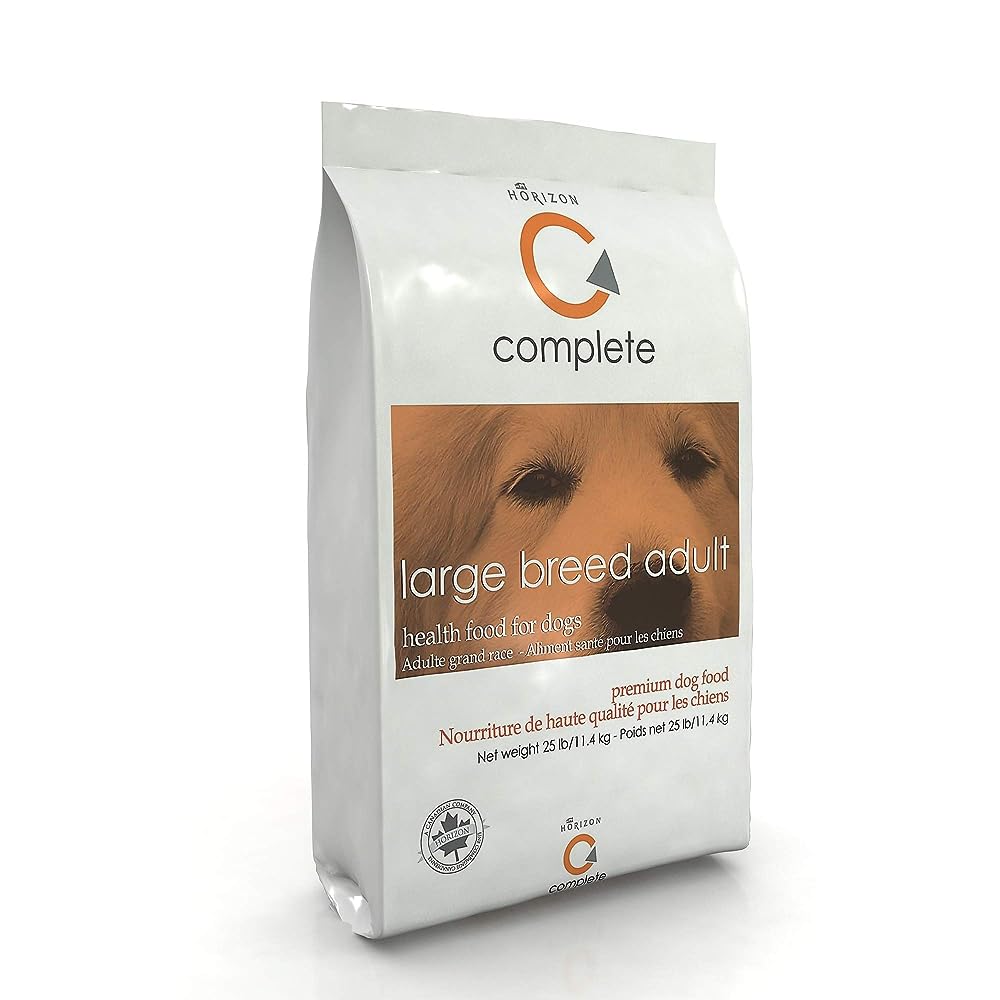

#7 – HORIZON PET NUTRITION Complete Whole Grain, Non-GMO, Meat Dense Large Breed Puppy Dry Dog Food, 25 lb Bag, (CLBP11)
The Horizon Pet Nutrition Complete Whole Grain Puppy Dry Dog Food is a meat-dense, non-GMO formula designed for large-breed puppies. With a high animal protein content of 71%, it focuses on providing essential nutrients for a puppy’s growth and development. The food also contains locally sourced whole grain carbohydrates and added vitamins, minerals, and probiotics to support overall health. Additionally, it includes Yucca schidigera for joint health and inflammation reduction.
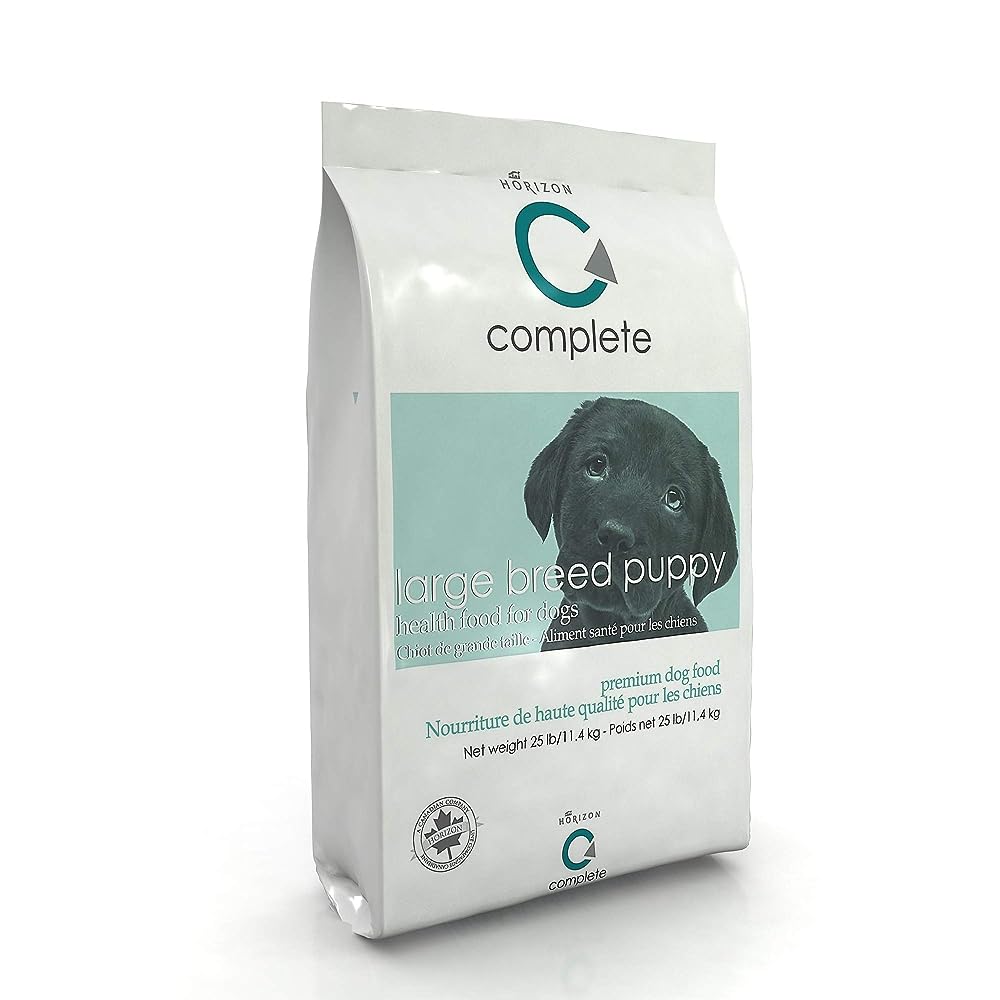

#8 – HORIZON PET NUTRITION Complete Whole Grain, Non-GMO, Meat Dense All Life Stage Dry Dog Food, 8 8 lb Bag, (CA4)
The HORIZON PET NUTRITION Complete Whole Grain dry dog food is a meat-dense formula that is free from by-products and rich in protein, with 71% animal protein content. It contains locally sourced, non-GMO whole grain carbohydrates that promote a low glycemic diet and avoid soy, corn, wheat, or potato. The formula also includes uniquely formulated vitamins, minerals, and probiotics to support gut and intestinal health. The ingredients are sourced locally whenever possible from trusted growers.


#9 – GATHER Endless Valley Plant Based Dog Food, 16 lb – Vegan Recipe – No GMOs, No Artificial Colors, Flavors or Preservatives – with Organic Ingredients – Complete Balanced Nutrition for Vegan Dogs
The GATHER Endless Valley Plant-Based Dog Food is a premium dry dog food made with certified organic, plant-based ingredients. It is specially formulated for adult dogs that thrive on a meat-free diet and is perfect for dogs with sensitivities to animal proteins. This dog food uses organic peas, oats, barley, and lentils to provide dogs with all the essential amino acids they need, while also including antioxidant-rich fruits and vegetables for immune support. Additionally, the packaging is sustainable, using 30% plant-based material.
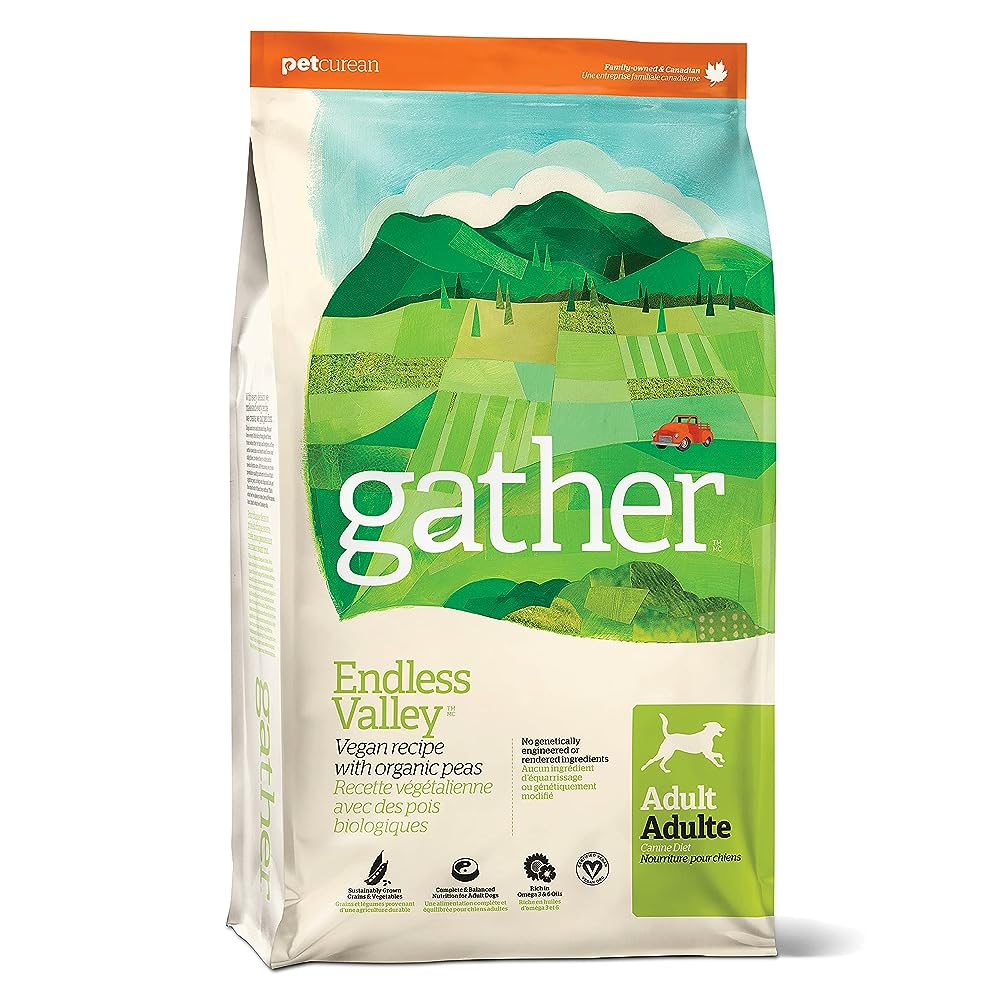

#10 – Dr. Mercola Healthy Pet Essentials Chicken and Beef Entree for Dogs, 3lbs (Makes 12lbs of Food), Non-GMO, Gluten Free, Soy Free (Free-Range Chicken)
The Dr. Mercola Healthy Pet Essentials Chicken and Beef Entree for Dogs is a 3lb bag of dehydrated food that can make 12 lbs of food when prepared. This product is free from GMOs, soy, and gluten, aligning with Dr. Mercola’s commitment to high-quality ingredients. The chicken entrée is carefully dehydrated, tested for quality, and fortified with vitamins and minerals, while also being free of antibiotics, added hormones, glycerin, and sugar. Additionally, the product comes with a 30-day money-back guarantee for customer satisfaction.
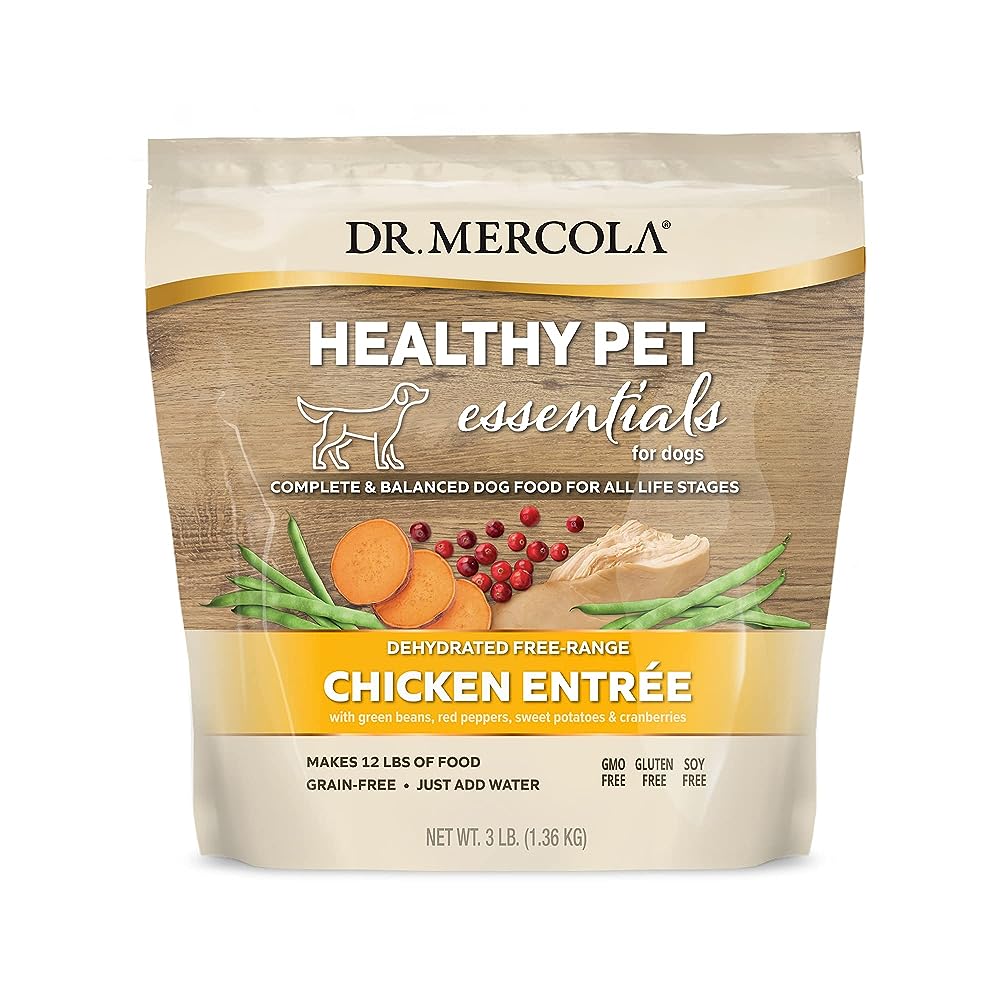
What Are The Benefits of Non-GMO Dog Foods?
The benefits of non-GMO dog foods are rooted in the preference for natural ingredients, transparency in sourcing, and a proactive approach to canine health. Here are several notable benefits:
- Natural Ingredients: Non-GMO dog foods are made without the use of genetically modified organisms, which means the ingredients are closer to their natural state. For pet parents seeking a more natural diet for their dogs, non-GMO foods can be a great option.
- Transparency and Traceability: Non-GMO dog foods often come from companies that value transparency and traceability in their ingredient sourcing. This can provide pet parents with more peace of mind knowing where the food’s ingredients come from and that they meet certain standards.
- Avoidance of Potential Health Risks: While the health risks associated with GMOs in pet foods remain a topic of debate and research, some pet parents choose non-GMO dog foods to err on the side of caution and potentially avoid any unknown long-term health effects.
- Less Exposure to Pesticides and Herbicides: Non-GMO crops are often (but not always) associated with organic farming practices, which typically involve reduced use of synthetic pesticides and herbicides. This can lead to lower levels of pesticide residues in the food.
- Allergy or Sensitivity Management: Some dogs with allergies or sensitivities to certain proteins or grains might respond better to non-GMO dog foods, although individual responses can vary widely.
- Support for Sustainable and Ethical Farming Practices: Choosing non-GMO dog foods may support farmers and companies that use non-GMO and potentially more sustainable and ethical farming practices.
- Nutritional Integrity: Some pet parents believe that non-GMO ingredients may retain more of their natural nutrients, as they have not been genetically altered.
It is important to note that while non-GMO dog foods offer these potential benefits, they are not inherently superior to GMO-containing foods in terms of nutrition. Quality can vary within both categories, so it is essential to look at the overall nutrient profile of the food, consult with a veterinary nutritionist or veterinarian, and consider your dog’s specific needs when making a decision.
What Genetically Modified Foods Are Most Common in Regular Dog Foods?
- What does non-GMO mean in dog food? Non-GMO dog food is made without ingredients that have been genetically modified. Genetically modified organisms (GMOs) have had their genetic material altered through genetic engineering. Non-GMO dog food will use ingredients that have been grown and harvested naturally, without genetic modification.
- Is non-GMO dog food healthier than regular dog food? There is no conclusive evidence that non-GMO dog food is inherently healthier than food containing GMO ingredients. Both non-GMO and GMO ingredients can meet necessary nutrition standards. The primary concern for pet owners should be whether the food meets the nutritional needs of their pet, as indicated by an AAFCO (Association of American Feed Control Officials) statement on the label.
- Why might some pet owners choose non-GMO dog food? Some pet owners prefer non-GMO dog food due to environmental concerns, as they believe non-GMO farming practices may be more sustainable. Others may have ethical concerns about genetic engineering, or they may believe that non-GMO foods are healthier or more natural.
- Is non-GMO dog food more expensive? Non-GMO dog food can be more expensive than regular dog food. This is often due to the higher costs associated with non-GMO farming practices and the certification process that proves the ingredients are non-GMO.
- How can I verify if a dog food is truly non-GMO? Look for a certification label on the packaging, such as the Non-GMO Project Verified seal. This certification ensures that the product meets rigorous standards for non-GMO status.
- Does non-GMO dog food contain fewer allergens? There is no evidence to suggest that non-GMO dog food inherently contains fewer allergens. Allergies in dogs are typically caused by specific proteins, and these can be present in both GMO and non-GMO ingredients.
- Can non-GMO dog food help with my dog’s sensitive stomach? Non-GMO dog food is not specifically designed to help with sensitive stomachs. If your dog has a sensitive stomach, consult with a veterinarian. They may recommend a special diet that is formulated to be easy to digest.
- Are there non-GMO dog foods that are also organic? Yes, many non-GMO dog foods are also certified organic. Organic certification often involves additional criteria, such as the avoidance of synthetic pesticides and fertilizers.
- Where can I buy non-GMO dog food? Non-GMO dog food is available at many pet supply stores, health food stores, and online retailers. It is becoming increasingly common as demand for non-GMO products grows.
- Is non-GMO dog food appropriate for all life stages and breeds? Like any other dog food, non-GMO dog food comes in formulations designed for various life stages and breeds. Always check the packaging to ensure that the food is appropriate for your dog’s age, size, and health needs, and consult with your veterinarian if you are unsure.
It’s important for pet owners to consult with a veterinary professional before making significant changes to a dog’s diet. Non-GMO dog food can be a healthy choice, but it is essential that the food meets the specific nutritional needs of the dog.
Frequently Asked Questions About Non GMO Dog Food
- What does non-GMO mean in relation to dog food? Non-GMO stands for non-Genetically Modified Organisms. In the context of dog food, this means that none of the ingredients used in the food have been genetically engineered or modified. These dog foods are made from natural ingredients that have not had their DNA altered through genetic engineering techniques.
- Why should I consider feeding my dog non-GMO dog food? Some pet owners prefer non-GMO dog food due to health, environmental, or ethical concerns. They may believe that non-GMO foods are safer and more natural. Additionally, non-GMO farming practices are often considered more sustainable and less harmful to the environment.
- Is non-GMO dog food more nutritious than regular dog food? There is currently no scientific evidence to suggest that non-GMO dog food is inherently more nutritious than food containing GMO ingredients. The important factor is the overall nutritional profile of the food, which should be appropriate for your dog’s age, size, health status, and activity level.
- Is non-GMO dog food more expensive? Non-GMO dog food can be more expensive due to the costs associated with non-GMO farming practices and certification processes. However, prices can vary widely between brands and products.
- How can I verify that a dog food is truly non-GMO? Look for a certification label on the packaging, such as the Non-GMO Project Verified seal. This certification ensures that the product meets rigorous standards for non-GMO status, providing an extra layer of trust for consumers.
- Are there any potential health risks associated with GMOs in dog food? As of now, scientific consensus holds that GMOs are safe to eat and nutritionally equivalent to non-GMOs. However, some pet owners choose non-GMO products due to concerns about the long-term effects of GMOs, which are still the subject of ongoing research.
- Can I find non-GMO dog food that is also organic? Yes, many non-GMO dog foods are also certified organic. Organic certification involves additional criteria beyond non-GMO, such as the avoidance of synthetic pesticides and fertilizers.
- Where can I buy non-GMO dog food? Non-GMO dog food is widely available at pet supply stores, health food stores, and online retailers. It is increasingly common as demand for non-GMO products grows.
- Is non-GMO dog food suitable for dogs with food allergies or sensitivities? Non-GMO status does not inherently make a dog food better for dogs with food allergies or sensitivities. It is important to read the ingredient list and consult with a veterinarian to find a diet that avoids known allergens for your dog.
- How do I transition my dog to a non-GMO diet? If you decide to switch your dog to a non-GMO diet, do so gradually over a period of 7-10 days. Start by mixing a small amount of the non-GMO food with your dog’s current food, and gradually increase the proportion of the new food while decreasing the old food. This allows your dog’s digestive system to adjust to the new diet slowly, reducing the risk of digestive upset.
Conclusion: Best Non-GMO Dog Foods
Choosing the right food for your furry friend is an essential part of pet ownership. With the rising interest in non-GMO options, pet parents now have a wealth of choices that align with a more natural and potentially safer approach to canine nutrition. In opting for non-GMO dog foods, you are making a conscious decision towards a diet that avoids genetically modified ingredients, reflecting a commitment to your pet’s long-term health and well-being. Remember, the best non-GMO dog food is one that meets all of your dog’s nutritional needs, is palatable to your pup, and fits within your budget. Always consult with a veterinary nutritionist or your vet to ensure the food you are considering is appropriate for your dog’s age, health status, and specific needs.
iHeartDogs is reader supported. Some of the links below may be paid affiliate links, where we receive a small commission on a product at no additional cost to you.
 Toledo, United States.
Toledo, United States.